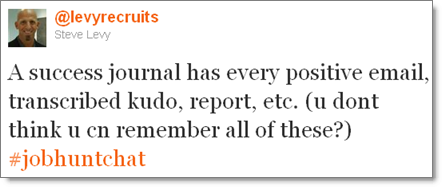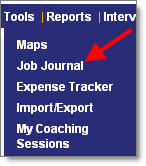I am a nut for job journals. When I speak I tell job seekers to take an entire day, go somewhere quiet (mountain?), and brainstorm past accomplishments.
I think, for multiple reasons, this is more important than spending all day on the computer.
Get away, document and brainstorm, and remember the great things you’ve ever done in your career.
Steve Levy, a recruiter in New York, recently tweeted this:
Then he followed up with this:
In JibberJobber we have a place where you can put these emails, transcribed kudos, reports, etc. and store them.
It’s all about CAREER MANAGEMENT.
Collecting this stuff helps you define your brand, and craft stories to communicate what you’ve done and why you are awesome.
As Steve says, “you don’t think you can remember all of these?”
You absolutely won’t remember all of them, especially when it most matters (in a networking setting, or in an interview).
That’s the premise of my most commented post, Depression Clouds Everything. The idea is that when your emotions get in the way, you get clouded, and can’t recall why you are awesome, or that you’ve ever done anything good in your career.
You might not use all of the stories, but just having them could really help you communicate much better, because stories back up what you say about yourself.
To get this in JibberJobber, login and then go to TOOLS, then Job Journal:
Seriously – take the time to do it and you’ll reap the benefits for many years to come!




One of the things I learned from teaching high school is keeping a journal is a valuable tool in processing emotions and reactions. Where I taught it was pretty much required to journal.
With my clients I encourage them to journal after every networking meeting or event. It allows them to process and record what happened. This creates a historical record that show them they really are making progress.
Right on, Alba!
Critical to a real career management journal is going back to the places where you did all this great stuff and updating your original accomplishments with “what happened after you left.”
If “they” kept using your “stuff” and the results continued to roll in, write it down? This is your LEGACY…your “test of time.” While you can’t take complete credit for the results after you left. just like children you produce, you can take some credit for all the good things they did because of your parenting…
@Marc – great thoughts. “Processing emotions and reactions” is really powerful, and very important to job seekers, especially during an emotionally messy time.
@Steve, thanks Levy! Great idea. I think my first inclination is to be jealous and resentful that they would continue to use my stuff, but that really is unfair thinking. You are right, and we should recognize when our stuff is so solid that it lives beyond our career there 🙂
Steve,
That is a really good idea. I developed and implemented a Briefing Center management system for IBM (I worked for an IBM Briefing Center) back in the middle of the 1990’s. It was finally displace in 2006/7 with a similar system that was externally developed. It was not better but just was supported by an existing company. Made me feel pretty good that something I developed lasted through the Y2K and for well over 10 years.